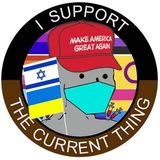Forwarded from BlackBox (Security) Archiv
Media is too big
VIEW IN TELEGRAM
France Set to Roll Out Nationwide Facial Recognition ID Program
Digital identity enrollment app to be rolled out in November
Privacy, absence of consent and security among concerns raised
France is poised to become the first European country to use facial recognition technology to give citizens a secure digital identity -- whether they want it or not.
👉🏼 Read more:
https://www.bloomberg.com/news/articles/2019-10-03/french-liberte-tested-by-nationwide-facial-recognition-id-plan
#france #id #FacialRecognition #nationwide #thinkabout #why #video
📡@cRyPtHoN_INFOSEC_DE
📡@cRyPtHoN_INFOSEC_EN
📡@cRyPtHoN_INFOSEC_ES
Digital identity enrollment app to be rolled out in November
Privacy, absence of consent and security among concerns raised
France is poised to become the first European country to use facial recognition technology to give citizens a secure digital identity -- whether they want it or not.
👉🏼 Read more:
https://www.bloomberg.com/news/articles/2019-10-03/french-liberte-tested-by-nationwide-facial-recognition-id-plan
#france #id #FacialRecognition #nationwide #thinkabout #why #video
📡@cRyPtHoN_INFOSEC_DE
📡@cRyPtHoN_INFOSEC_EN
📡@cRyPtHoN_INFOSEC_ES
Forwarded from BlackBox (Security) Archiv
This is how you kick facial recognition out of your town
Bans on the technology have mostly focused on law enforcement, but there’s a growing movement to get it out of school, parks, and private businesses too.
In San Francisco, a cop can’t use facial recognition technology on a person arrested. But a landlord can use it on a tenant, and a school district can use it on students.
This is where we find ourselves, smack in the middle of an era when cameras on the corner can automatically recognize passersby, whether they like it or not. The question of who should be able to use this technology, and who shouldn’t, remains largely unanswered in the US. So far, American backlash against facial recognition has been directed mainly at law enforcement. San Francisco and Oakland, as well as Somerville, Massachusetts, have all banned police from using the technology in the past year because the algorithms aren’t accurate for people of color and women. Presidential candidate Bernie Sanders has even called for a moratorium on police use.
Private companies and property owners have had no such restrictions, and facial recognition is increasingly cropping up in apartment buildings, hotels, and more. Privacy advocates worry that constant surveillance will lead to discrimination and have a chilling effect on free speech—and the American public isn’t very comfortable with it either. According to a recent survey by Pew Research, people in the US actually feel better about cops using facial recognition than they do about private businesses.
👉🏼 Read more:
https://www.technologyreview.com/s/614477/facial-recognition-law-enforcement-surveillance-private-industry-regulation-ban-backlash/
#surveillance #facialrecognition #lawenforcement #regulation #thinkabout
📡@cRyPtHoN_INFOSEC_DE
📡@cRyPtHoN_INFOSEC_EN
📡@cRyPtHoN_INFOSEC_ES
Bans on the technology have mostly focused on law enforcement, but there’s a growing movement to get it out of school, parks, and private businesses too.
In San Francisco, a cop can’t use facial recognition technology on a person arrested. But a landlord can use it on a tenant, and a school district can use it on students.
This is where we find ourselves, smack in the middle of an era when cameras on the corner can automatically recognize passersby, whether they like it or not. The question of who should be able to use this technology, and who shouldn’t, remains largely unanswered in the US. So far, American backlash against facial recognition has been directed mainly at law enforcement. San Francisco and Oakland, as well as Somerville, Massachusetts, have all banned police from using the technology in the past year because the algorithms aren’t accurate for people of color and women. Presidential candidate Bernie Sanders has even called for a moratorium on police use.
Private companies and property owners have had no such restrictions, and facial recognition is increasingly cropping up in apartment buildings, hotels, and more. Privacy advocates worry that constant surveillance will lead to discrimination and have a chilling effect on free speech—and the American public isn’t very comfortable with it either. According to a recent survey by Pew Research, people in the US actually feel better about cops using facial recognition than they do about private businesses.
👉🏼 Read more:
https://www.technologyreview.com/s/614477/facial-recognition-law-enforcement-surveillance-private-industry-regulation-ban-backlash/
#surveillance #facialrecognition #lawenforcement #regulation #thinkabout
📡@cRyPtHoN_INFOSEC_DE
📡@cRyPtHoN_INFOSEC_EN
📡@cRyPtHoN_INFOSEC_ES
